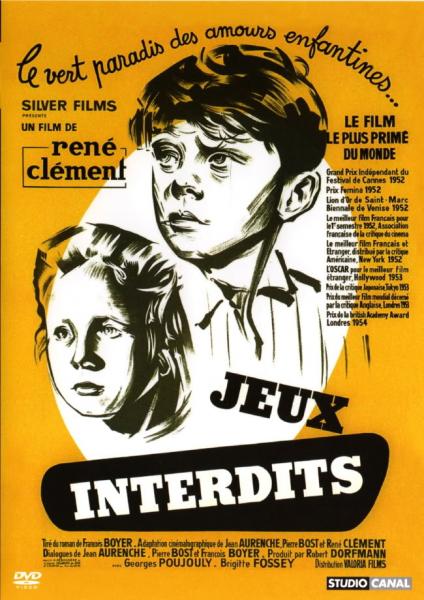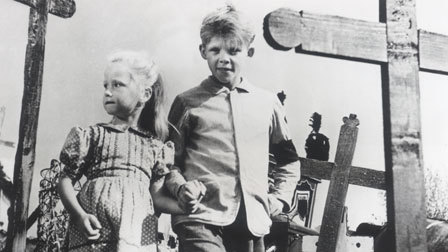BOOK REVIEW: Jeux Interdits (Forbidden Games)

 Classics Revisited: A Child’s-Eye View of Wartime
Classics Revisited: A Child’s-Eye View of Wartime
Jeux Interdits (Forbidden Games)
Directed by René Clément
1952; in French; available (with English subtitles) from Netflix
There are no battlefield scenes in Forbidden Games and only one explicit war scene; most of the movie takes place in the bucolic French countryside, at some remove from the fighting. Yet World War II is ever present. Forbidden Games, about the impact of the war on two children, has won a place on the list of great antiwar films of all time.
In the opening scene, an endless stream of Parisian families moves along a country road, some in overloaded vehicles, some on foot, carrying children or suitcases or both. They are fleeing the approaching German occupation. But they cannot even flee in peace; German planes rain bombs down on the refugees, followed by smaller, lower-flying planes that mow down many of the survivors. A mother throws herself over her child to protect her—and succeeds, at the cost of her own life. Her husband is also killed. Only the five-year-old girl survives, clutching her dog.
But the dog, too, is dead, and the little girl wanders disconsolately away from the road and the carnage, through meadows and woods, still carrying the dog as if she can somehow revive him, until she is found by an older child. Seeking his lost cow, he finds the lost girl. In answer to his questions, she says she is Paulette. Her mother? Dead. Her father? Dead. He is Michel, he says, and then, moved by her plight, brings her home to his family of farmers, who agree—if reluctantly—to take the orphan in.
At 11, Michel is the youngest in the family and unlike his parents and siblings, has no other person to tend, only the animals. Forbidden Games turns on his adoption of Paulette as his charge. When she cries out in the night, reliving the terror of the bombing, he soothes her. When she weeps for her dead dog, he promises her a funeral for Jacques.

They bury Jacques in a nearby abandoned mill. The funeral, complete with makeshift cross on the grave, does comfort her, so much that when Michel finds a dead mole, he stages a second funeral. Michel’s older brother, who was run over by a horse fleeing the bombardment, dies of his injuries. Responding to still more death, Michel and Paulette escalate the funeral game, actively seeking out dead creatures to bury. Michel is even ready to provide corpses, but Paulette tearfully insists that they must not kill anything. Whether he obeys this prohibition is unclear, but he does begin to steal for their funerals: ready-made crosses, taken first from the community’s hearse, then from the church, and finally from graves in the village cemetery. The funeral games, begun as a way for the two innocents to cope with the death around them, have taken on a life of their own, one that slowly skews Michel’s moral compass and possibly Paulette’s.
It’s a tale made the more compelling by the two child actors, Georges Poujouly as Michel and the luminous five-year-old Brigitte Fossey as Paulette. More than half a century later, Forbidden Games remains a wrenching reminder of more than one of the many reasons pacifists oppose war.
